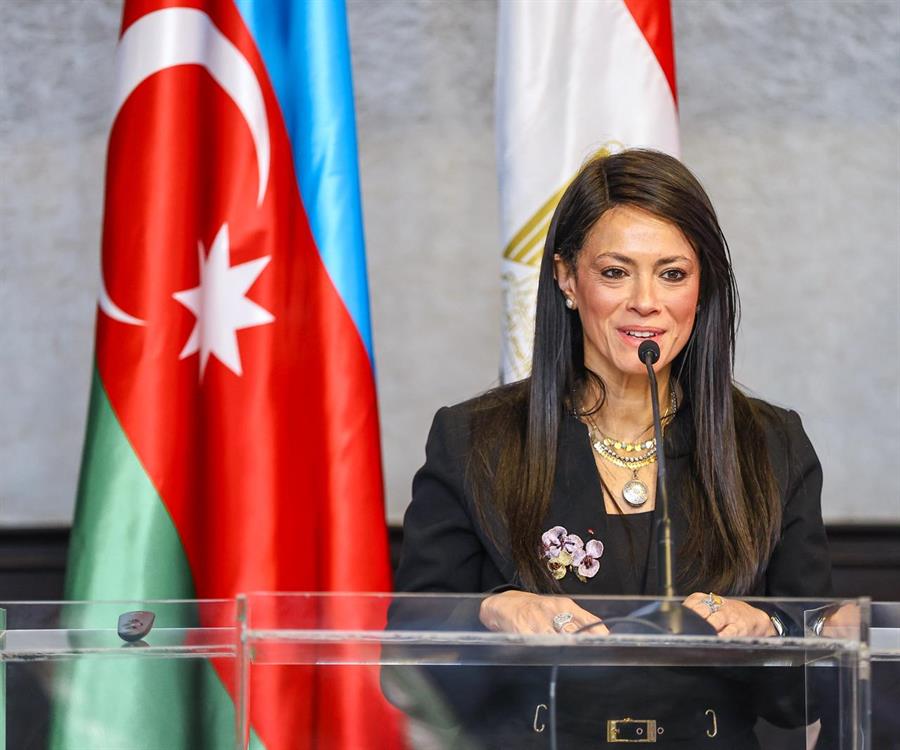Planning,Health Ministers Launch First Healthcare Governance Forum, Sign Cooperation Protocols for Sector Advancement

27 June 2024
Today, Dr. Hala El Said, Minister of Planning and Economic Development and Chairperson of the Board of Trustees of the National Institute for Governance and Sustainable Development, Dr. Khaled Abdel Ghaffar, Minister of Health and Population, and Dr. Sherifa Sherif, Executive Director of the National Institute for Governance and Sustainable Development, inaugurated the first Healthcare Governance Forum. The forum is held in collaboration between the Ministry of Health, the Governance Institute, and the Medical Affairs Secretariat of the Cabinet, with Thunderbird School of Global Management in the United States. The event was attended by leaders from both ministries, Dr. Ahmed Taha, President of the General Authority for Health Accreditation and Regulation, as well as academic members of parliament and experts in the healthcare field and civil society.
During her opening speech, Dr. Hala El Said emphasized the Egyptian state's commitment to the healthcare sector, highlighting the International Annual Conference of the National Planning Institute, the scientific and research arm of the Ministry of Planning and Economic Development, themed "Health and Sustainable Development." This underscores the state's importance in this vital sector, particularly noting that health is a central goal among the UN's 17 Sustainable Development Goals. She noted that the forum addresses another aspect of the sector, focusing on establishing good healthcare services and promoting the welfare of Egyptian citizens through sound governance to enhance the capabilities of healthcare entities, thereby supporting the establishment of a sustainable national healthcare system in Egypt.
El Said also stressed the importance of governance in economic policies, accountability, and involving all stakeholders to ensure efficient policies through scrutiny and accountability of their implementation.
Regarding international trends in healthcare governance, El Said explained that international studies, particularly those from the World Health Organization's Global Health Economics Council, emphasize the importance of coherence between health, economic, social, and environmental policies. This proactive approach aims to achieve efficiency and sustainable development to create a robust and productive healthcare system capable of addressing health crises, particularly highlighted by the COVID-19 pandemic, which exposed the weaknesses in global healthcare capabilities and significant health disparities worldwide, underscoring the urgent need for governance in this sector.
El Said also highlighted the importance of data governance stemming from data automation amidst rapid technological advancements such as artificial intelligence, emphasizing the need for a comprehensive healthcare data governance system starting from birth and death registries to institutional healthcare governance. She emphasized that these data are crucial not only for the healthcare sector but also nationally, noting that real-time birth monitoring benefits all developmental plans, aiding in identifying gaps and required services at the village level, facilitated by a structured healthcare data governance system.
El Said reiterated that healthcare governance in Egypt serves as a tool to enhance healthcare system efficiency, ensuring a balance between accessibility and quality services, thereby improving the quality of life for Egyptian citizens. She affirmed that health is fundamental to any developmental efforts.
Regarding the role of the Ministry of Planning and Economic Development, represented by the National Institute for Governance and Sustainable Development, El Said explained that the institute serves as a vital training arm for the ministry, continuously adapting to all developments. She noted the launch of the first training program session in the United States in collaboration with Thunderbird School of Global Management and the Egyptian Ministry of Health for 35 healthcare professionals and 4 leaders from the Cabinet's Medical Committee starting July. The second session will be held in Cairo with approximately 20 participants who completed the initial training phase. The program includes a "Train the Trainer" (TOT) phase to certify these individuals as accredited trainers by Thunderbird School of Global Management, ensuring program sustainability in Egypt and building further Egyptian capacities in this field.
El Said emphasized that the program is part of the state's efforts to enhance healthcare system efficiency and effectiveness by involving all relevant stakeholders in this program.
She also highlighted the institute's role in developing a national governance index in partnership with various local and international entities, reflecting the actual situation in society. This is achieved through an independent survey in collaboration with international academic institutions and universities to provide a governance index reflecting the actual governance status in Egypt aimed at improving the situation.
She further pointed out the institute's role in monitoring and evaluating Egypt's status in governance, sustainable development, regional and international competitiveness, and local healthcare, aiming to develop plans and mechanisms to enhance Egypt's performance in governance and competitiveness indices, also noting the institute's launching of several capacity-building programs that have trained 3,300 state administrative officials and youth in sustainable development.
Minister Khaled Abdel Ghaffar of Health and Population affirmed that healthcare system governance contributes to developing relations between various stakeholders involved in healthcare, including government medical facilities, private sector development partners, healthcare service providers, civil society organizations, all benefiting patients and their families.
Dr. Khaled Abdel Ghaffar stated that effective healthcare system administration involves delivering high-quality medical services, cost-effectiveness, equity, transparency in service accessibility, and governance's role in efficiently managing resources, building trust, ensuring justice in healthcare access, innovation, accountability, transparency, crisis management, ethical and legal compliance, and improving healthcare quality. He added that institutional governance serves as a conceptual framework explaining how public sector institutions interact with citizens and other institutions.
The Minister clarified that institutional governance of the healthcare system ensures a collaborative environment accountable based on sound research evidence. Within this framework, organizations and entities are responsible for continuously improving the quality of their medical services, maintaining high levels of care, and creating an environment conducive to excellence in clinical care, including patient service, employee engagement, clinical effectiveness, risk management, safety, data accuracy and information, continuous education, and training.
The Minister continued, stating that the pillars of healthcare system governance rely on transparency, responsibility, stakeholder engagement based on accurate data and information, ensuring information availability on healthcare policies, financing, performance, facilitating access to it, establishing mechanisms to involve healthcare providers, policy makers, and institutions in healthcare decision-making, using data and evidence to guide healthcare policies and measure their impact, ensuring all individuals have access to basic healthcare services regardless of their social, economic status, or geographical location.
The Minister emphasized that successful governance of healthcare systems depends on assessing the current situation, regulatory frameworks, envisioning the future, policy development, objective independent evaluation by experts, allocating appropriate resources, and outlining obstacles affecting operations. He highlighted the organizational structure of the Ministry of Health and Population, the National Health and Development Strategy, as well as the General Administration of Governance and Internal Audit at the Ministry of Health and Population, which effectively manages resources and ensures infrastructure efficiency, activating accountability mechanisms, and building human resources.
The Minister addressed the collaboration program with Thunderbird University, aiming to train 35 healthcare service providers to build and qualify professionals and leaders in healthcare governance by presenting global best practices, contributing to achieving Egypt's Vision 2030 in the healthcare sector.
Minister Abdel Ghaffar emphasized that the first Healthcare Governance Forum aims to highlight the importance of healthcare governance in improving healthcare and enhancing transparency, exchanging knowledge and experience on best practices in healthcare governance, analyzing challenges and opportunities related to implementing healthcare governance policies, providing high-quality healthcare, enhancing cooperation and partnerships between healthcare institutions, civil society, and the private sector in healthcare governance, ensuring an effective framework to ensure proper resource management, informed decision-making, and delivering high-quality healthcare services fairly and impartially.
Dr. Sherifa Sherif, Executive Director of the National Institute for Governance and Sustainable Development, affirmed the importance of cooperation and integration with all state agencies to provide good services to citizens. Sherif reviewed the development of the Governance and Sustainable Development Institute since its inception, assuming the governance and sustainable development file to keep pace with developments and within the framework of Egypt's Vision 2030.









